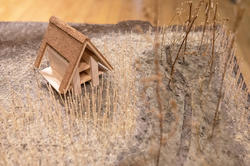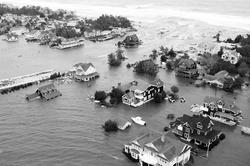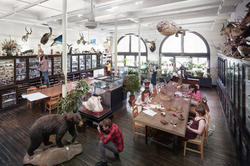Students in two spring 2023 studios used scientific methodologies combined with design thinking to explore collaborative future living.
Ten RISD Finalists Selected for Terra Carta Design Lab Competition

“To build a productive and sustainable future, it is critical that we accelerate and mainstream sustainability into every aspect of our economy.” So reads the charter of the Terra Carta Design Lab (TCDL), an international competition funded by the Sustainable Markets Initiative and launched in 2021 by King Charles III seeking innovative, scalable solutions for mitigating the worldwide climate and biodiversity crises. This year, RISD is one of four design schools taking part in the competition, along with Dubai Institute of Design and Innovation (UAE), National Institute of Design Ahmedabad (India) and the Royal College of Art (UK).
“This global effort is an incredible opportunity for RISD students and alumni to apply the question-based inquiry approach they learn at RISD,” notes RISD President Crystal Williams. “This is also an important opportunity to help elevate and include voices and people who have been historically underrepresented in conversations about sustainability and the climate crisis.”
“This global effort is an incredible opportunity for RISD students and alumni to apply the question-based inquiry approach they learn at RISD.”

“The principles guiding the competition align beautifully with RISD’s priorities, particularly with our commitment to centering art and design as the pillars upholding a more sustainable world,” adds RISD Provost Touba Ghadessi. “This is what schools of art and design do. We imagine, we create, we envision new possibilities and we realize them.”
Current RISD students and recent alums were invited to submit proposals back in January, and the response was huge: 35 collaborative applications from 79 students and recent alums addressing everything from supply chain traceability, regenerative yard practices and biomaterial innovations to sustainable food practices, construction industry material sourcing solutions and interdisciplinary environmental education.
“I was struck by the mandate of the Terra Carta to address sustainability in a holistic sense in terms of business practice, while centering the ability of artists and designers to collaborate with nature on providing answers to climate justice questions,” says RISD TCDL Program Manager Sara Ossana MIA 05. “This work complements RISD’s culture of innovation and disruption across industries, shifting cultural perspectives and bringing a deeper meaning to the built environment and how we interface with our planet and resources. Those ideas can be seen clearly in the projects that were proposed.”
After narrowing the pool to 15 proposals via a jury of RISD faculty, staff and alums, RISD’s TCDL team began working with the applicants to refine their concepts by putting together a business incubator program. They collaborated with strategic communications agency DADA Goldberg, environmental and social justice nonprofit Slow Factory and other relevant organizations and introduced the design teams to eight project advisors who provided tailored mentoring sessions. All of the teams also had access to coaching from RISD staff members Tim Maly, senior lead in RISD’s Center for Complexity, and Jennifer Bissonnette, director of the Edna W. Lawrence Nature Lab.


In early May, a panel of jurists selected 10 finalists from the remaining RISD proposals. Associate Director of Strategic Partnerships Katherine Cooper notes that the jurists considered each proposal’s ability to foreground historically underrepresented and minoritized populations. “RISD’s strategic goal to operate at the intersection of sustainability, social justice and innovation readied our community for this opportunity,” they say.
Among the shortlist of entries are three projects focused on biomaterials developed through engagement with the Nature Lab: Biopods, cofounded by recent grads Manini Banerjee 24 ID and Avantika Velho 22 ID as a means of cleaning up the Providence River and restoring wetlands; SHAPESHFT, which focuses on turning discarded plastics into raw material for artists and is led by Felix Arwen 23 ID, Shagun Jain 23 ID and Dway Lunkad 24 FAV/SC; and Shellf Life, headed up by Felicia Neuhof MArch 24, which transforms discarded mollusk shells into a versatile biomaterial.
Two of the finalists, Hoppi and Wild Lives, focus on kids. The former, led by Luca Cuccia and Natalie Rizk MArch 22, transforms brewery waste into nontoxic, biodegradable toys, thus minimizing the toy industry’s carbon footprint. The latter, overseen by project leads Reilly Blum 21 FD and Jasmine Gutbrod 20 FD/MA 21 AE, provides interdisciplinary environmental education using trail cameras to encourage children to actively observe, explore and connect to local ecosystems.


Adults who want to do their part in saving the planet are the focus of two of the remaining finalist projects. FutureYard, an app developed by alum Isabelle Saxton 20 AP, empowers people with access to yards and green spaces to increase native biodiversity, soil health and carbon storage through simplified regeneration plans. Soilless, led by industrial designers Westen Johnson 19 ID and Julie Joo 19 ID, allows those who don’t have outdoor spaces to grow their own food, reducing food waste and the harmful impact of inefficient commercial farms on the planet (think pesticides, packaging and transportation).
The three remaining projects are geared toward industry and construction. Map Collective, founded by alum Tara Gupta 19 FAV, provides a software solution for corporate and government employees for automating supply chain transparency, tracking sustainability metrics, planning decarbonization and making green procurement decisions. Surplus, led by architects Aanya Arora BArch 24 and Michael J Farris BArch 23, focuses specifically on surplus building materials for contractors with the goal of cutting down on landfill waste. Wastes Harmonize Worlds, the brainchild of Yechen Zhu MID 24, also focuses on building industry waste, specifically brick and clay tile, with the goal of creating fewer landfills and decreasing the demand for clay extraction.
“RISD recognizes that discovery and experimentation are critical for realizing the significance of art and design in the world,” says Vice Provost for Strategic Partnerships Sarah Cunningham, “and the TCDL competition is a perfect example of that. Partnerships like this one help to develop new knowledge, build just societies and contribute to innovative modes of sustainability.”
Later this summer, these 10 projects will be assessed by the Terra Carta Design Lab’s global judging panel, led by Sir Jony Ive (a 2009 RISD Honorary Degree recipient) and Sustainable Markets Initiative CEO Jennifer Jordan-Saifi. In the fall, two of the RISD teams (and two from each of the other competing institutions) will each be awarded £100,000 prizes to bring their projects to life.
Learn more about the competition and 10 shortlisted project proposals.
Simone Solondz / top image: SHAPESHFT rendering
July 1, 2024


